- Home
- Sebastian Junger
A World Made of Blood (Kindle Single) Page 2
A World Made of Blood (Kindle Single) Read online
Page 2
Fighters emerge by twos and threes, the guys who’ve been left behind to guard the town. They keep their distance from the new arrivals, so Andre walks over to them, and Daniel follows a few minutes later. He takes out his notebook and writes, Destroyed colonial town pink facades a few kids on guard no apparent order. The day is already getting hot, and the sun hasn’t even risen.
“These guys say there’s a big fight going on at a town called Mile 91, on the road to Makeni,” Andre says. He’s snapping photos of the kids while he talks. “I think we should go.”
“What was yesterday like?” Daniel asks, flipping his notebook open. “What was the battle like?”
The kid unleashes a fast, guttural account that is accompanied by chops and slashes with his hands. Daniel barely understands any of it. He writes what he sees: Native fighters with loops of ammunition over their shoulders and leather pouches and feathers and beaded fetishes around their necks.
“They came in last morning and cleared the plaza and killed three rebels,” Andre says. “There were at least two hundred rebels. They’re regrouping up-country. There’s going to be a big fight.”
Daniel scribbles, 200 rebels, three dead. “Is it safe to go up there?”
“Da road dae no’ fine,” the kid says. “So so soljahman, so so rebel.”
“The road’s no good—too many soldiers, too many rebels,” Andre translates.
“What do you think of those guys?” Daniel says, jerking his thumb over his shoulder at the soldiers. The kid spits into the dust. Daniel offers the kid a cigarette, which he takes. He pulls one out for himself but doesn’t light it. It occurs to him that he’s smoking too much. He can quit when this thing’s over with. A few more fighters wander toward them with their guns over their shoulders. Some have sunglasses and some have no shirts and some are barefoot. Most of them have lines of parallel scars on their cheeks that were put in when they were young. Pretty soon there’s a crowd of ten or twelve of them pressed around. Daniel hands out more cigarettes. They’re so young that if it weren’t for the guns, he’d feel like some schoolyard pervert corrupting the neighborhood children. “This is a waste of time,” Daniel says to Andre. “We’re not getting anything.”
“We’re not getting a ride, that’s for sure,” Andre says. He drops his camera back onto the strap around his neck. The kids are starting to lose interest and edge off around the empty plaza. Daniel hasn’t eaten in twenty-four hours and his stomach is a sour mix of bile and cigarettes. He’s starting to think about disengaging from the group and walking back to the APC when he hears the sound of a car engine. Two pickup trucks come around a building from the other side of town, drive through the plaza, and come to a stop in the open. A dozen fighters jump out. They’re from one of the militia groups. The letters CDF are badly painted on the door of one of the trucks: the Civilian Defense Force, a frankly terrifying bunch of lunatics who would probably be attacking Freetown if they hadn’t been bribed into defending it. Daniel can see the captain watching them carefully. “Those guys,” says Andre. “Maybe those guys.”
Even at a distance, the energy coming off them is agitated and ugly; the kids in the square seem to sense it as well. Daniel reluctantly follows Andre over to the trucks. It doesn’t even feel safe to approach them, much less beg a ride to the front, but the fighters barely acknowledge their presence. There’s a dead guy in the back of one of the trucks, but Daniel doesn’t know if he’s a rebel or not. There’s a lot of excited talk. Daniel doesn’t understand much of it—he busies himself writing down what he sees. Local color: it’s better than nothing. Andre finally barges into the conversation. “Mile 91,” he says. “We’re trying to get to Mile 91.”
This prompts a lot of shouting. The CDF commander pulls back the cocking bolt on his machine gun and points the barrel into Andre’s chest. His eyes are blank with an inexplicable rage. “NO, NO,” he screams. “Whatin na’ you name?”
Andre doesn’t flinch. Daniel feels his bowels slide around hotly inside him. “Andre and Daniel,” Andre says. “We’re journalists. We’re hoping to go north.”
All the men seem to have both hands on their guns. The commander screams some more, and the other fighters look around uncomfortably. The sun is barely up and we’re in trouble, Daniel thinks. Andre has his hands up apologetically, and he starts to back up, and Daniel backs up with him, and soon they’re walking back to the APC. The soldiers stare at them when they return. Andre doesn’t say anything, just walks by them to the fresh early-morning shade behind the APC and sits down against one of the oversize tires. “All right, I give up,” he says. “We’ll take the next ride out of here.”
A little while later, the CDF trucks start up and drive off with five or six fighters in the back and more hanging out the windows, rifles and RPGs pointing up into the air. One of them fires off a short burst from his gun, and the shots clatter across the plaza and make everyone jump, even the captain. A sick infusion of adrenaline doesn’t reach Daniel’s system until long after the echoes have died off, and it lingers in his gut for a while like warm poison.
* * *
Their ride comes that afternoon. Andre doesn’t say a word the entire time, and Daniel is just as glad; they sit hungry and silent, watching the road leading west to Freetown. Daniel pretends he has decided to leave Africa—in fact, to leave journalism—to see how it makes him feel, but it doesn’t seem to solve anything. A whole new set of problems appear. What’s more frightening at age thirty: a rebel checkpoint or a job interview for a life you don’t want? Eventually a convoy of trucks appears in the heat-shimmer a mile away, and the soldiers take up positions, because of course there are no radios and no communication, and they have no idea who it is. The trucks turn out to be regular army—four flatbeds filled with soldiers and a Suzuki Samurai sporting a bad camouflage paint job and more soldiers standing up in the back. The trucks chug to a stop in the shade, and the soldiers jump down and start unloading ammunition. Daniel watches the captain walk over to talk with them.
“You think he’s trying to get us a ride?” Daniel asks.
“I think he’s trying to get us the fuck out of here, if that’s what you mean,” Andre answers.
The captain is gesturing vigorously and then turns to look at them and continues talking. Several of the soldiers look over as well.
“I think we’ve just become part of our story,” Daniel says. “That’s a big ethical no-no at journalism school.”
Andre flicks a pebble into the dirt. “Ethics,” he grunts. “I’d drive this piece of shit myself if they’d let me.”
Andre as some kind of rogue reporter who’s gone native up-country with an APC is not hard for Daniel to imagine. He has the sort of hard confidence—coupled with a deep exasperation with the natives—that kept the Brits in control of places like this for centuries. But he also has a nearly bottomless sympathy for the locals that Daniel can’t hope to match. Daniel is endlessly polite—he never yells at the drivers or the translators or tries to bully the soldiers—but in his heart he knows he also doesn’t give a damn about these people. At the end of the day, he’s going home and Andre isn’t—Andre belongs here, and the locals can tell that in an instant.
The conversation over by the trucks breaks up, and the captain starts walking back toward the APC. Andre and Daniel get to their feet. “This better be good,” Andre mutters. The captain stops in front of them, looking displeased. The other soldiers look away.
“You’re leaving now and you will not come back,” the captain says in his good English. He’s obviously had some schooling, maybe even in London. “You’ve caused a lot of problems.”
“What kind of fucking problems?” says Andre. “We’re journalists, and we’re just trying to do our work.”
“You didn’t get permission from the minister of information to come out here,” the captain says. “You know very well you were supposed to. Back in Freetown, they’re saying you’re spies.”
Spies is bad, Daniel thinks. Sp
ies gets you killed.
“Spies? You know damn well we’re not spies,” Andre says, his voice rising. “This is fucking outrageous. We have press passes from your government.”
The captain goes from polite to steely in an instant. The soldiers shift on their feet, unsure whether to stay out of it or present some kind of backup for their captain. The captain is shouting now: “You are in a military zone without permission. You have asked about troop strength. You’re trying to get up to the front line. Do you have a satellite phone in your bag?”
“Of course we don’t have a satellite phone,” Andre says. “If we did—”
“If you do,” the captain interrupts, “you will be taken right over there and shot. Soldier!” One of the young soldiers jerks to attention. “Take control of these men.”
The bewildered soldier cocks his machine gun and points it unsteadily at their bellies. Daniel can feel his heart suddenly whacking sickly in his chest. His head is not swimming yet, but that’s next. Andre is holding on to some measure of indignation that will either save them or get them killed.
“Over there!” the captain shouts. Daniel and Andre walk off into the sunlight and stand there squinting while the captain kneels down and starts to go through their bags. Daniel is unsure whether he should put his hands in the air, but Andre hasn’t, and so he just stands there trying to look unconcerned. Daniel watches the captain throw all of Andre’s camera gear onto the ground and then open the knapsack and upend it until everything—the water bottle, the flashlight, his book, his precious notes—has tumbled out. Scattered in the packed red dirt, their belongings look pathetic, almost embarrassing. Dead bodies look pathetic in the same way, Daniel thinks. He hasn’t seen very many, but on some level there’s always some smug thought, “I’m alive, you’re dead.” There’s no greater gulf between two people, no greater inequality.
“You are very lucky,” the captain says. “I would have had a very difficult decision to make, but I am a soldier, and I assure you I would have made it.”
Daniel can’t even bring himself to think about the sat phone. That’s for later; that’s for some long, sick drunk in Nairobi before he goes home. Andre and Daniel are allowed to collect their belongings while the soldiers look off in embarrassment. The one who had his gun on them walks off across the plaza and comes back a few minutes later driving the Suzuki. He risks an apologetic smile and waves them into the truck. The captain says, “If you come back here without permission, you will be shot.” Andre ignores him and climbs into the passenger seat of the truck, and Daniel throws his bag into the backseat and then gets in next to it. The captain walks off, the soldier forces the stick shift into first. He seems to want to get out of there as fast as they do. He’s seventeen, maybe eighteen, and if nothing else he’s going back to Freetown for the day.
Andre is sitting sullenly in front, watching the jungle scroll by, a scraggly green wall occasionally broken by a burnt house or a clearing. The soldier looks over brightly to say something but notices the expression on Andre’s face and decides against it.
“Hey, my name’s Daniel, and my friend here is Andre,” Daniel says, leaning forward into the front seat. The soldier’s Kalashnikov is wedged next to the hand brake; he can feel the muzzle against his chest.
“Na’ me name Sammy,” the kid says, glancing back in the mirror.
“Do you live in Freetown?”
“Yessah.”
“Are you going to see your family?”
“Yessah.”
The kid goes on to say something in Krio that Daniel doesn’t understand. The language is a thick blend of English, French, and native dialects that should be easy to understand, but it isn’t. Then you wake up one morning, Andre says, and suddenly you understand everything.
“He’s inviting us to his house for dinner,” Andre says without turning his head.
“Thank you,” Daniel says. “Maybe we’ll do that.”
Portrait of a soldier and his family, he thinks. A soldier’s-eye view of the war. It’s better than nothing.
“Were you here last year? Were you here for ’99?”
Ninety-nine was the rebel occupation—it lasted two weeks, and it was hell on earth. Amputation squads, children made to shoot their own parents, women raped on bridges and then thrown over the side. There were almost no journalists in the city to report it, and perhaps in a sense it was unreportable anyway.
“Na boat we tek go Guinea, na’ now a de ton back kam,” Sammy says. “A kam back fo’ go skul, na day soljahman dem ketch we, tay tiday nary a ah dae.”
“He went to Guinea but came back for school,” Andre says flatly. “The army caught him, so now here he is.”
The kid says this with a smile, like he’s glad it has all worked out this way. Maybe because he’s driving us two idiots around, Daniel thinks. He’s probably never been in a car with two white guys before. Daniel sees something up ahead on the road, a dark shape askew in some kind of disastrous way. Andre sees it too and instinctively puts his hand on his camera. “Rebel dead,” the kid says. He pulls over to the left to head around it, a pickup truck flipped over onto its roof. It must have been hit by something big, a tank round maybe.
“Stop!” Andre yells. “Stop the truck!”
The kid is startled and skids the Suzuki to a halt. Andre has the door open even before it’s stopped moving. Engine parts are sprayed across the road, and two charred corpses lie contorted in the wreckage. Andre puts the camera to his eye and crouches down, moving from angle to angle, his motor drive whirring.
“Na’ bad bad place dis,” the kid says, turning to Daniel apologetically. “So so rebel, ah no’ go able koba yu oh.”
Lots of rebels, he can’t protect us, Daniel thinks—something along those lines. “Andre!” Daniel shouts. “Andre, come on, let’s go. It’s not safe.”
Andre doesn’t answer. He’s close up to one of the corpses now, the camera right in its face, click, whir, click, whir. Embarrassment tugs at Daniel, but the kid could care less about the dignity of dead rebels at the moment. He’s too worried about live ones.
“Na’ bad bad place dis,” the kid repeats, still convinced Daniel can do something. “Na’ rebel ah de watch for so.”
Daniel just shrugs. The kid waits another moment, looking at him hopefully, and then gets out of the truck with his gun and walks out to the middle of the road. He starts turning slowly in a circle with the gun at his shoulder, scanning the forest for trouble. Jesus, he’d die for us right here if he had to, Daniel thinks. There’s nothing else to do, so Daniel climbs out of the truck too and walks over to the wreckage and looks down at one of the rebels. His arms are flung over his head and he has a shocked expression on his face, as if in that final moment he had time to register his disbelief. Mouth open, eyes wide, teeth bared. Andre straightens up and drops the camera back onto his neck.
“Okay,” he says. “Done. Let’s go.”
The kid looks over with relief when he sees them move back toward the truck. He lowers his gun and hurries over. “Na’ bad bad place dis.”
Soon they’re speeding down the road again, the forest a pale blur on both sides. Andre empties his camera and slides the roll into his vest pocket and loads a fresh roll. “The editors will never run those photos, but it’s good to send that kind of stuff,” he shouts over the wind. “It reminds them where the fuck you are.”
“Yeah,” Daniel says without much interest. The stunned expression on the dead guy’s face is still in his head. “It sure does.”
* * *
The next time the car slows down, it’s half an hour later and Daniel is thinking about Nairobi—about Jennifer, more precisely. It’s been a month since she left him, and they’ve spoken a few times on the phone, but it’s mostly a charade of pretending there’s something left. He carries a kind of bleak nostalgia for her that he realizes—in his better moments—is more about fear than about love. The truck’s speed backs off a notch and Daniel can feel the kid braking—more of
a question mark than a real braking action—and he looks up. “Shit,” Andre says.
At first he thinks it’s just another checkpoint, but those are manned by regular army. These guys are shirtless and ill-grouped, ranged along one side of the road with their weapons leveled. Daniel feels Andre go tense. “This doesn’t look good, mate,” he says.
It’s all wrong even before they pull to a full stop. Daniel recognizes the CDF commander from earlier that morning, standing apart from the others. The rest are training their guns on the car. One kid even has a grenade launcher leveled at them. If he fires it, he’ll kill us and half his friends, Daniel thinks. The commander is stripped to the waist and has an ammunition belt over his muscular chest. He’s strung with necklaces of cowry shells and amulets and leather satchels, and he’s got some kind of bowler on his head with a hatband made of more bullet shells. He’s holding a machete in one hand and a pistol in the other, and he walks toward the car pointing the machete at the driver and unloading an incomprehensible torrent of Krio invective. Daniel barely understands a word.
The kid in the driver’s seat puts his palms out and tries to explain himself, but the commander cuts him off in a fury and puts the machete under his chin. The kid falls silent, hands still up. Daniel catches something about the Suzuki and the captain back in town—it’s a matter of respect and doesn’t seem to have anything to do with them—but when Andre tries to intercede, one of the fighters swears and cocks his machine gun with a loud clack. He takes three steps backwards, everyone looks at him, and then with a sudden laugh he simply starts shooting.
Time doesn’t slow down or stop or do anything particularly exotic, and Daniel certainly doesn’t think anything brave. His mind is still wallowing in disbelief, encumbered by some Western sense that certain things are not allowed to happen and other things certainly can’t happen to him, when the gunfire crashes through the heavy midday air. It is only then that he realizes one of the other fighters must have grabbed the barrel of the gun and jerked it upward, because they’re wrestling for the gun now and otherwise the inconceivable would already have happened: he would now be doubled over in the backseat with his chest cavity impossibly opened up and the darkness rushing in on him like some final eclipse of the sun.

 War
War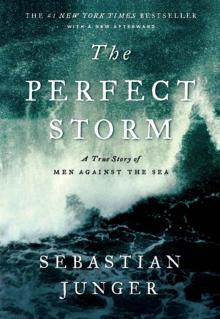 The Perfect Storm: A True Story of Men Against the Sea
The Perfect Storm: A True Story of Men Against the Sea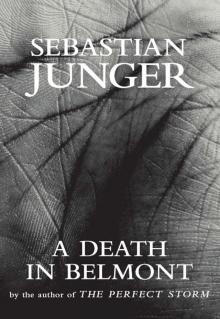 A Death in Belmont
A Death in Belmont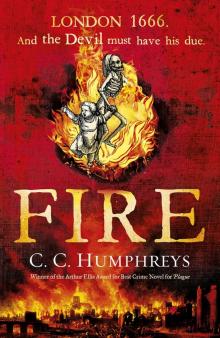 Fire
Fire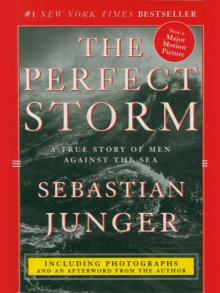 The Perfect Storm
The Perfect Storm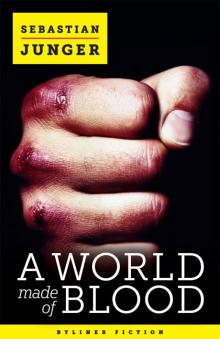 A World Made of Blood (Kindle Single)
A World Made of Blood (Kindle Single)